- Home
- Sherman Alexie
Ten Little Indians: Stories Page 2
Ten Little Indians: Stories Read online
Page 2
Corliss caught the number 7 home from the library. She wanted to read Harlan Atwater’s book on the bus, but she also wanted to keep it private. The book felt dangerous and forbidden. At her stop, she stepped off and walked toward her apartment, and then ran. She felt giddy, foolish, and strangely aroused, as if she were running home to read pornography. Once alone, Corliss sat on the floor, backed into a corner, and read Harlan Atwater’s book of poems. There were forty-five free-verse sonnets. Corliss found it interesting that an Indian of his generation wrote sonnets, while other Indians occupied Alcatraz and Wounded Knee. Most of the poems were set in and around the Spokane Indian Reservation, so Corliss wondered again why she’d never heard of this man. How many poetry lovers were among the Spokanes? Fifty, thirty, fewer than twenty? And how many Spokanes would recognize a sonnet when they saw it, let alone be able to write one? Since her public high school teachers had known how much Corliss loved poetry, and had always loved it, why hadn’t one of them handed her this book? Maybe this book could have saved her years of shame. Instead of trying to hide her poetry habit from her friends and family, and sneaking huge piles of poetry books into her room, maybe she could have proudly read a book of poems at the dinner table. She could have held that book above her head and shouted, “See, look, it’s a book of poems by another Spokane, what are you going to do about that?” Instead, she’d endured endless domestic interrogations about her bookish nature.
During one family reunion, her father sat around the living room with his three brothers. That was over twelve hundred pounds of Spokane Indian sharing a couch and a bowl of tortilla chips. Coming home from school, Corliss tried to dash across the room and make her escape, but one uncle noticed the book under her arm.
“Why you always reading?” he asked.
“I like stories,” she said. It seemed to be the safest answer. Indians loved to think of themselves as the best storytellers in the world, and maybe they were, but did they need to be so sure of it?
“She’s reading those poems again,” her father said. “She’s always reading those poems.”
She loved her father and uncles. She loved how they filled a room with their laughter and rank male bodies and endless nostalgia and quick tempers, but she hated their individual fears and collective lack of ambition. They all worked blue-collar construction jobs, not because they loved the good work or found it valuable or rewarding but because some teacher or guidance counselor once told them all they could work only blue-collar jobs. When they were young, some authority figure had told them to pick up a wrench, and so they picked up the wrench and never once considered what would happen if they picked up a pencil or a book. Her father and uncles never asked questions. How can you live a special life without constantly interrogating it? How can you live a good life without good poetry? She knew her family feared poetry, but they didn’t fear it because they were Indian. The fear of poetry was multicultural and timeless. So maybe she loved poetry precisely because so many people feared it. Maybe she wanted to frighten people with the size of her poetic love.
“I bet you’re reading one of those white books again, enit?” the first uncle asked.
“His name is Gerard Manley Hopkins,” Corliss said. “He wrote poems in the nineteenth century.”
“White people were killing Indians in the nineteenth century,” the second uncle said. “I bet this Hopkins dude was killing Indians, too.”
“I don’t think so,” Corliss said. “He was a Jesuit priest.”
Her father and uncles cursed with shock and disgust.
“He was a Catholic?” her father asked. “Oh, Corliss, those Catholics were the worst. Your grandmother still has scars on her back from when a priest and a nun whipped her in boarding school. You shouldn’t be reading that stuff. It will pollute your heart.”
“What do you think those white people can teach you, anyway?” the third uncle asked.
She wanted to say, “Everything.” She wanted to scream it. But she knew she’d be punished for her disrespect of her elders. Because she was Indian, she’d been taught to fear and hate white people. Sure, she hated all sorts of white people—the arrogant white businessmen in their wool suits, the illiterate white cheerleaders in their convertibles, the thousands of flannel-shirted rednecks who roamed the streets of Spokane—but she knew they represented the worst of whiteness. It was easy to hate white vanity and white rage and white ignorance, but what about white compassion and white genius and white poetry? Maybe it wasn’t about whiteness or redness or any other color. Corliss wasn’t naive. She knew racism, tribalism, and nationalism were encoded in human DNA, and we’d all save our own child from a burning building even if it meant a thousand strangers would die, and we’d all kill in defense of our wives, husbands, brothers, sisters, parents, and children. However, she also wanted to believe in human goodness and mortal grace. She was contradictory and young and confused and smart and unformed and ambitious. How could she tell her father and uncles she read Hopkins precisely because he was a white man and precisely because he was a Jesuit priest? Maybe Hopkins had been an Indian killer, or a supporter of Indian killers, but he’d also been a sad and lonely and lovely man who screamed to God for comfort, answers, sleep, and peace. Since Corliss rarely found comfort from her family and friends, and never found it in God, but continued to want it and never stopped asking for it, then maybe she was also a Jesuit priest who found it in poetry. How could she tell her family that she didn’t belong with them, that she was destined for something larger, that she believed she was supposed to be eccentric and powerful and great and all alone in the world? How could she tell her Indian family she sometimes felt like a white Jesuit priest? Who would ever believe such a thing? Who would ever understand how a nineteen-year-old Indian woman looked in the mirror and sometimes saw an old white man in a white collar and black robe?
“I’ve got to go,” Corliss said. “I’ve got homework.”
“Give me that book,” the second uncle said. He took the book from her, opened it at random, and read, “‘Glory be to God for dappled things— / For skies of couple-colour as a brinded cow.’”
All of the men laughed.
“What the hell does that mean?” the third uncle asked.
“It’s a poem about a cow,” her father said. “She’s always reading poems about cows.”
“You can’t write a poem about a cow, can you?” the first uncle asked. “They’re ugly and stupid. I thought poems were supposed to be pretty and smart.”
“Yeah, Corliss,” the second uncle said. “You’re pretty and smart, why are you wasting your time with poems? You should be studying science and math and law and politics. You’re going to be rich and famous. You’re going to be the toughest Indian woman around.”
How could these men hate poetry so much and respect her intelligence? Sure, they were men raised in a matriarchal culture, but they lived in a patriarchal country. Therefore, they were kind and decent and sensitive and stupid and sexist and unpredictable. These husbands were happily married to wives who earned more money than they did. These men bragged about their spouses’ accomplishments: Ha, my woman just got a raise! My honey makes more money than your honey! My wife manages the whole dang Kmart, and then she comes home and manages us! She’s a twenty-first-century woman! Nah, I ain’t threatened by her! I’m challenged! Who were these Indian men? What kind of warriors were they? Were Crazy Horse and Geronimo supportive of their wives? Did Sitting Bull sit with his wife for weekly chats about the state of their relationship? Did Red Cloud proudly send his daughter out to fight the enemy? Corliss looked at her father and saw a stranger, a loving stranger, but a stranger nonetheless.
“And I’ll tell you what,” her father said. “After Corliss graduates from college and gets her law degree, she’s going to move back to the reservation and fix what’s wrong. We men have had our chances, I’ll tell you what. We’ll send all the tribal councilmen to the golf courses and let the smart women run the show. I’ll tell you wh
at. My daughter is going to save our tribe.”
Yes, her family loved and supported her, so how could she resent them for being clueless about her real dreams and ambitions? Her mother and father and all of her uncles and aunts sent her money to help her through college. How many times had she opened an envelope and discovered a miraculous twenty-dollar bill? The family and the tribe were helping her, so maybe she was a selfish bitch for questioning the usefulness of tribalism. Here she was sitting in a corner of her tiny apartment, pretending to be alone in the world, the one poetic Spokane, and she was reading a book of poems, of sonnets, by another Spokane. How could she ever be alone if Harlan Atwater was somewhere out there in the world? Okay, his poems weren’t great. Some of them were amateurish and trite, and others were comedic throwaways, but there were a few poems and a few lines that contained small bits of power and magic:
The Little Spokane
My river is not the same size as your river.
My river is smaller and colder.
My river begins in the north
And rushes to find me.
My river calls to me.
I swim it because it is water.
Water doesn’t care about anybody
But this water cares about me.
Or maybe it doesn’t care about me.
Maybe the river thinks I’m driftwood
Or a rubber tire or a bird or a dead dog.
Maybe the river is not a river.
Maybe the river is my father.
Maybe he’s smaller and colder than your father.
Corliss had swum the Little Spokane River. She’d floated down the river in a makeshift raft. She’d drifted beneath bridges and the limbs of trees. She’d been in the physical and emotional places described in the poem. She’d been in the same places where Harlan Atwater had been, and that made her sad and happy. She felt connected to him and wanted to know more about him. She picked up the telephone and called her mother.
“Hey, Mom.”
“Corliss, hey, sweetie, it’s so good to hear your voice. I miss you.”
Her mother was a loan officer for Farmers’ Bank. Twenty years earlier, she’d started as a bank teller and had swum her way up the corporate fish ladder.
“I miss you, too, Mom. How is everybody?”
“We’re still Indian. How’s school going?”
“Good.”
All of their conversations began the same way. The mother-daughter telephone ceremony. Corliss knew her mother would soon become emotional and tell her how proud the family was of her accomplishments.
“I don’t know if we tell you this enough,” her mother said. “But we’re so proud of you.”
“You tell me every time we talk.”
“Oh, well, you know, I’m a mother. I’m supposed to talk that way. It’s just, well, you’re the first person from our family to ever go to college.”
“I know, Mom, you don’t need to tell me my résumé.”
“You don’t need to get smart.”
Corliss couldn’t help herself. She loved her mother, but her mother was a bipolar storyteller who told lies during her manic phases and heavily exaggerated during her depressed times. Those lies and exaggerations were often flattering to Corliss, so it was hard to completely resent them. According to the stories, Corliss had already been accepted to Harvard Medical School but had declined because she didn’t feel Harvard would respect her indigenous healing methods. You couldn’t hate a mother full of such tender and flattering garbage, but you could certainly view her with a large measure of contempt.
“I’m sorry, Mom. Listen, I picked up this book of poems—”
“Corliss, you know how your father feels about those poems.”
“They’re poems, Mom, not crack.”
“I know you love them, honey, but how are you going to get a job with poems? You go to a job interview, and they ask you what you did in college, and you say ‘poems,’ then what are your chances?”
“Maybe I’ll work in a poem factory.”
“Don’t get smart.”
“I can’t help it. I am smart.”
Corliss knew she was smart because her mother was smart, but she also knew she’d inherited a little bit of her mother’s crazies as well. Why else would she be calling to talk about a vanished Indian poet? The crazy mother–crazy daughter telephone ceremony!
“So did you call to break my heart,” her mother said, “or do you have some other reason?”
“I called about this book of poems.”
“Okay, so tell me about your book of poems.”
“It’s written by this guy called Harlan Atwater. It says he’s a Spokane. Do you know him?”
Her mother was the unofficial historian of the urban Spokane Indians. Corliss figured “historian” and “pathological liar” meant the same thing in all cultures and countries.
“Harlan Atwater? Harlan Atwater?” her mother repeated the name and tried to place it. “Nope. Don’t know him. Don’t know any Spokanes named Atwater.”
“His book was published in 1972. It’s called In the Reservation of My Mind. Do you remember that?”
“I don’t read books much.”
“Yes, I know, Mom. But you’re aware there are inventions called books and inside some of those books they have things called poems.”
“I know what books are, smart-ass daughter.”
“Okay, then, have you heard of this book?”
“No.”
“Are you sure?”
“Yes, I’m sure.”
“I thought you knew every Spokane.”
“I guess I don’t. Have you looked him up on the Internet?”
“How do you know about the Internet?”
“I’m old, Corliss, I’m not stupid.”
“Oh, jeez, Mom, I’m sorry. I don’t mean to be such a jerk. It’s just, this book, is pretty cool. It’s getting me all riled up.”
“It’s okay. You’re always riled up. I love that about you.”
“I love you, too, Mom. I got to go.”
“Okay, bye-bye.”
Corliss hung up the telephone, grabbed her backpack and coat, and hurried to the campus computer lab. She was too poor to afford her own computer and was ashamed of her poverty. Corliss talked her way past the work-study student who’d said the computers were all reserved by other poor students. She sat at a Mac and logged on. Her user name was “CrazyIndian,” and her password was “StillCrazy.” She typed “Harlan Atwater, Native American poet, Spokane Indian” into the search engine and found nothing. She didn’t find him with any variations of the search, either. She couldn’t find his book on Amazon.com, Alibris.com, or Powells.com. She couldn’t find any evidence that Harlan Atwater’s book had ever existed. She couldn’t find the press that had published his book. She couldn’t find any reviews or mention of the book. She sent e-mails to two dozen different Indian writers, including Simon Ortiz, Joy Harjo, Leslie Marmon Silko, and Adrian C. Louis, and those who responded said they’d never heard of Harlan Atwater. She paged through old government records. Maybe he’d been a criminal and had gone to prison. Maybe he’d been married and divorced. Maybe he’d died in a spectacular car wreck. But she couldn’t find any mention of him. The library didn’t have any record of where or when the book had been purchased. The Spokane Tribal Enrollment Office didn’t have any records of his existence. According to the enrollment secretary, who also happened to be Corliss’s second cousin, there’d never been an enrolled Spokane Indian named Atwater. Corliss was stumped and suspicious. Every moment of an Indian’s life is put down in triplicate on government forms, collated, and filed. Indians are given their social security numbers before the OB/GYN sucks the snot and blood out of their throats. How could this Harlan Atwater escape the government? How could an Indian live and work in the United States and not leave one piece of paper to mark his passage? Corliss thought Harlan Atwater might be a fraud, a white man pretending to be an Indian, seeking to make a profit, to co-opt and
capitalize. Then again, what opportunistic white man was stupid enough to think he could profit from pretending to be a Spokane Indian? Even Spokane Indians can’t profit from being Spokane! How many people had ever heard of the Spokane Tribe of Indians? Corliss felt like a literary detective, a poetic gumshoe, Sam Spade with braids. She worked for hours and days, and finally, two weeks after she first came across his book, she found an interview printed in Radical Seattle Weekly:

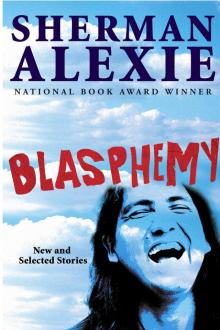 Blasphemy: New and Selected Stories
Blasphemy: New and Selected Stories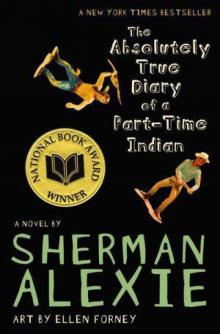 The Absolutely True Diary of a Part-Time Indian
The Absolutely True Diary of a Part-Time Indian Flight
Flight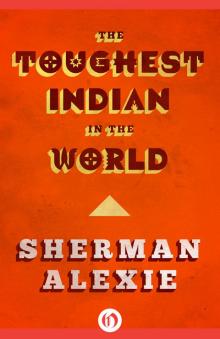 The Toughest Indian in the World: Stories
The Toughest Indian in the World: Stories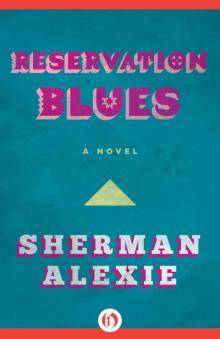 Reservation Blues
Reservation Blues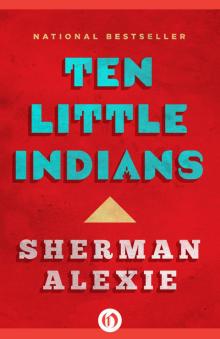 Ten Little Indians: Stories
Ten Little Indians: Stories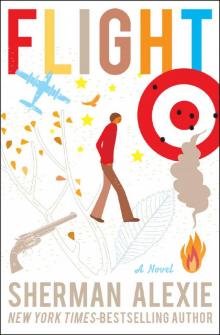 Flight: A Novel
Flight: A Novel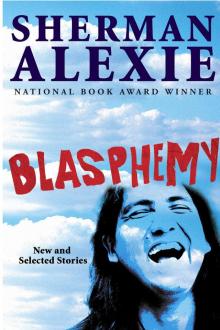 Blasphemy
Blasphemy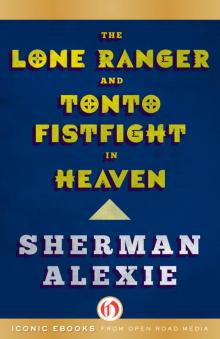 The Lone Ranger and Tonto Fistfight in Heaven
The Lone Ranger and Tonto Fistfight in Heaven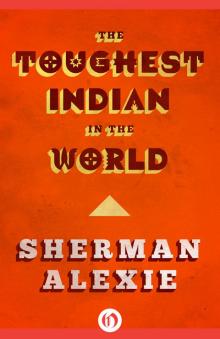 The Toughest Indian in the World
The Toughest Indian in the World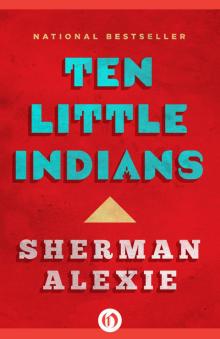 Ten Little Indians
Ten Little Indians